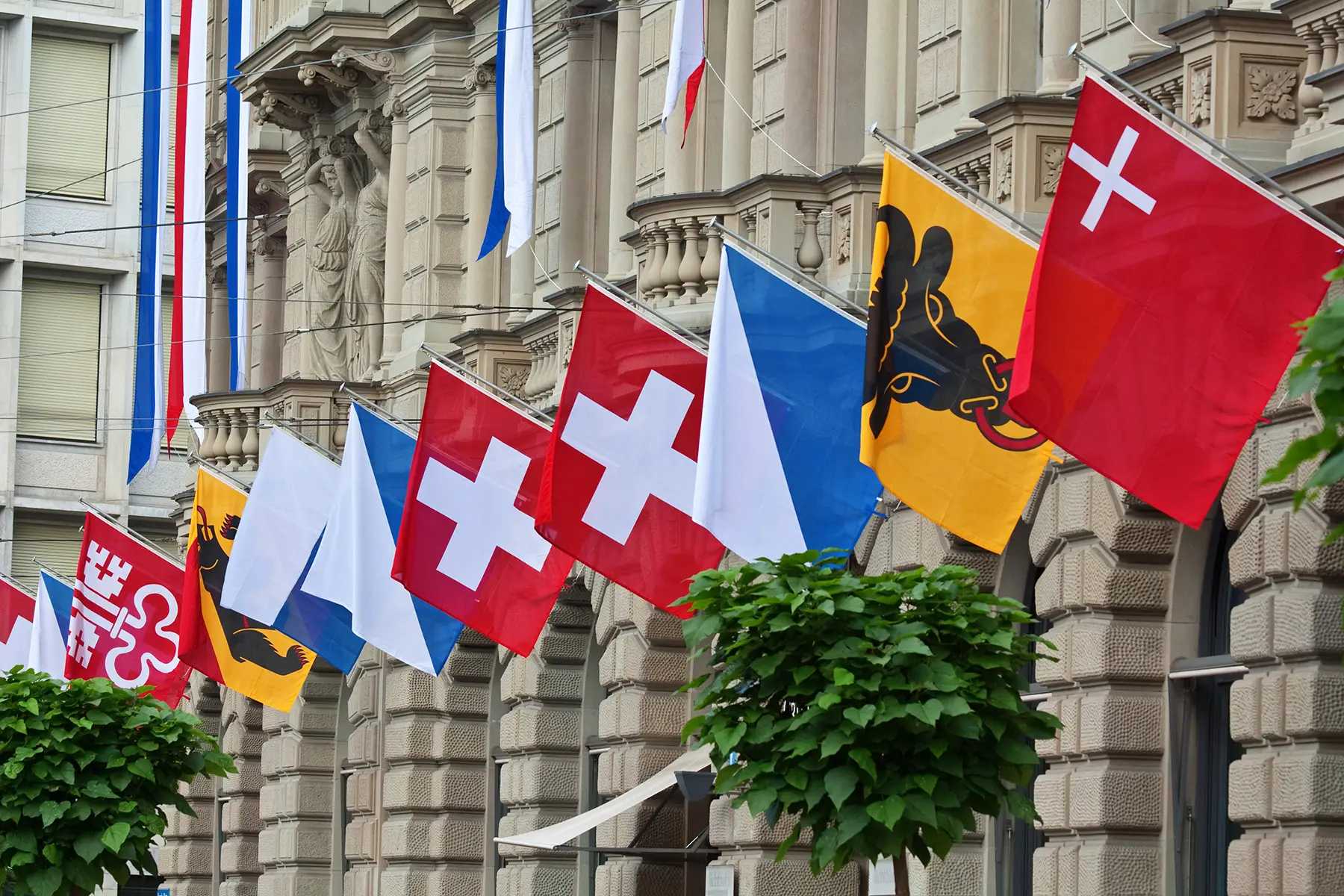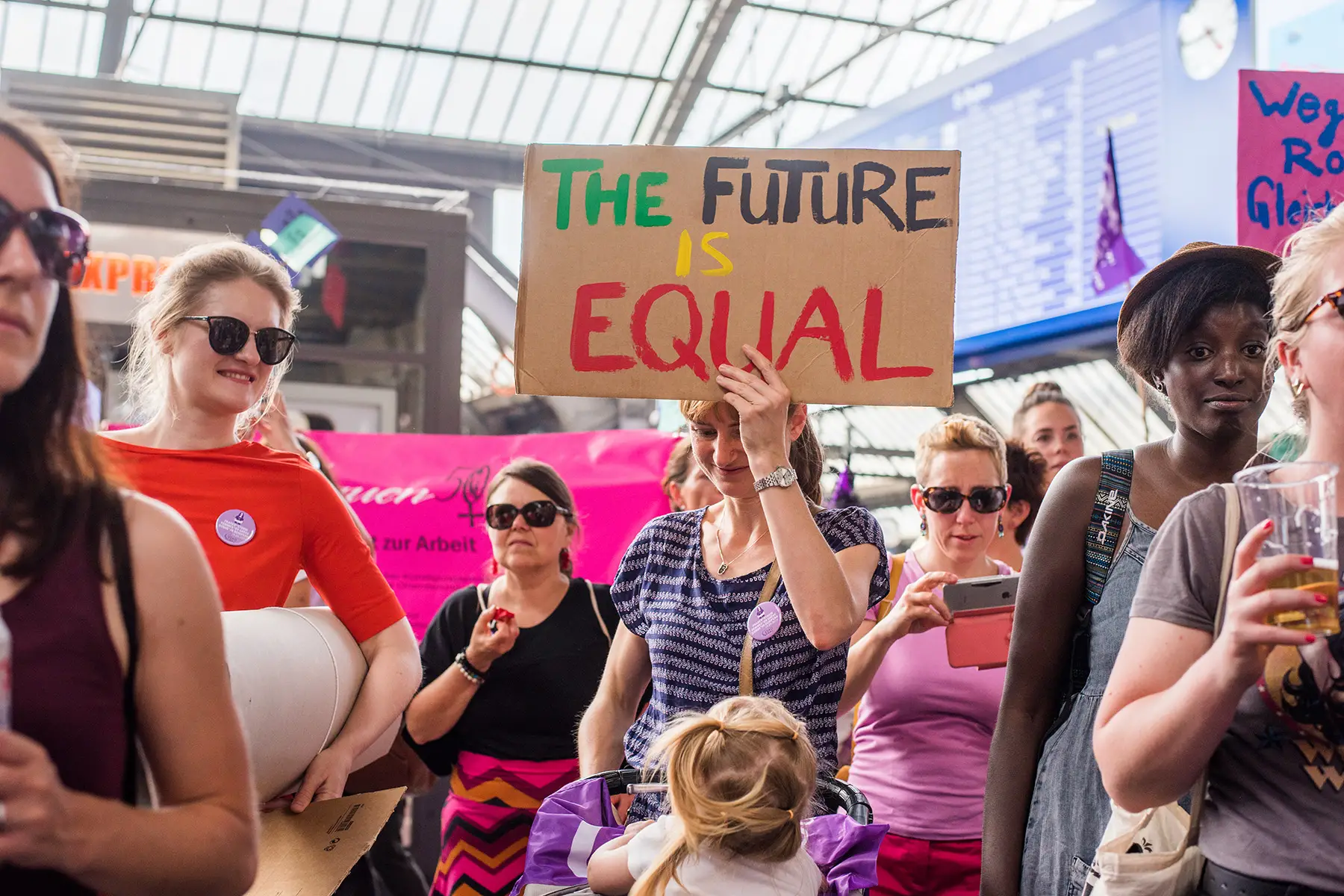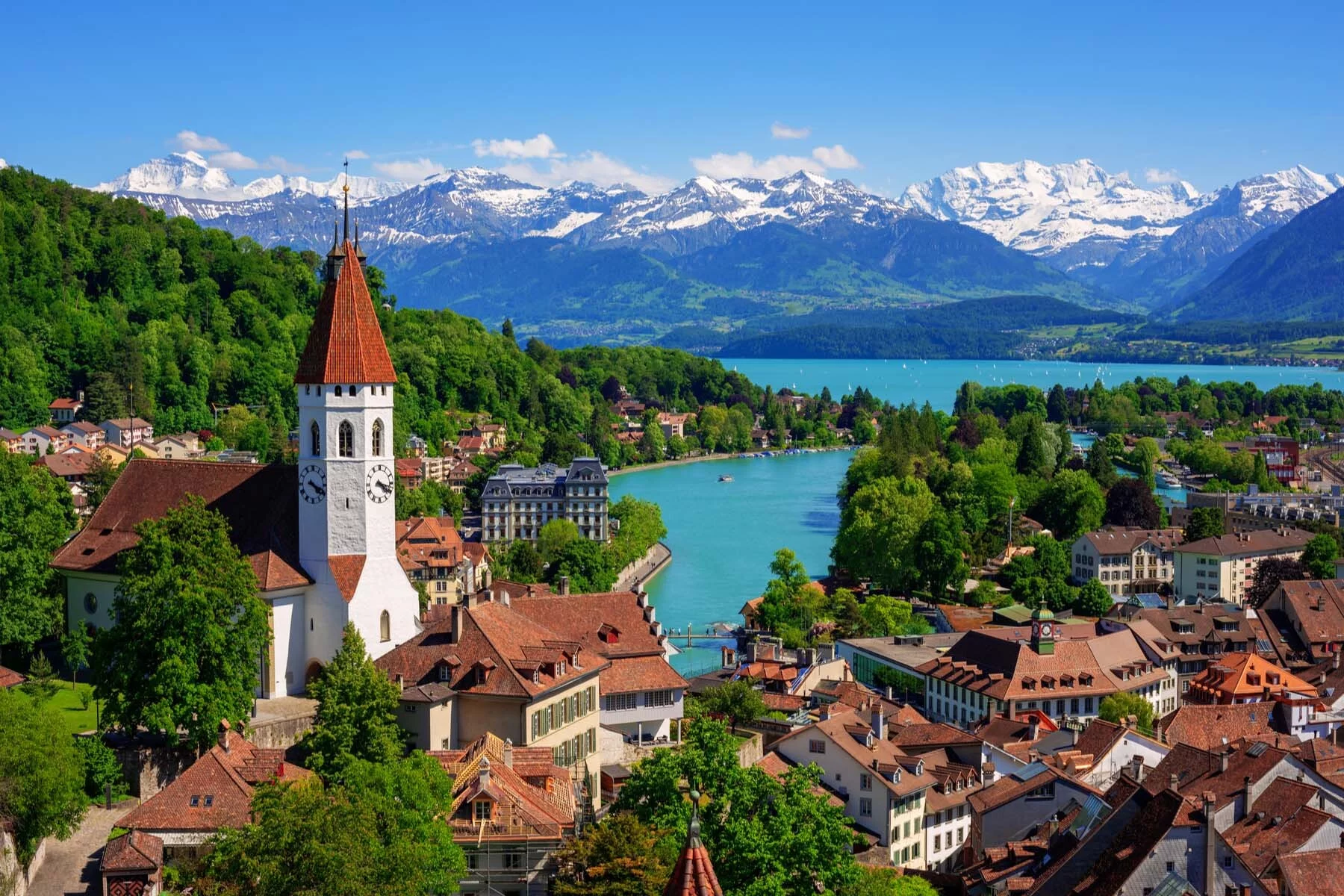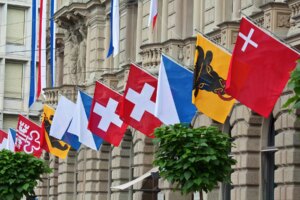Switzerland’s multilayered government is unlike anything you’ve ever seen before. But whether you’re voting, following the news, or just wondering what is up with the Swiss’ neutrality, a little political context might be interesting to read.
Here’s what you need to know about Swiss politics:
- Overview of politics in Switzerland
- The main political parties in Switzerland
- The Swiss Federal Council: who is currently in power?
- The electoral system in Switzerland
- Political representation in Switzerland
- What is the political landscape in Switzerland?
- What is the state of the Swiss economy?
- Grassroots politics and political activism
- Useful resources
Ground News
Get every side of the story with Ground News, the biggest source for breaking news around the world. This news aggregator lets you compare reporting on the same stories. Use data-driven media bias ratings to uncover political leanings and get the full picture. Stay informed on stories that matter with Ground News.
Overview of politics in Switzerland
Switzerland is one of the rare examples of a federal republic with direct democracy.
A federal state unites (partially) self-governing regions under one national administration. In Switzerland, the regions are 26 cantons and 2,172 communes or municipalities. The direct democracy bit means that the Swiss population may directly vote on federal, cantonal, and municipal laws and policies. This is different from most other democracies, where elected representatives approve or reject legislation.
The country’s heads of state and government are the seven members of the Swiss Federal Council (German: Bundesrat, French: Conseil fédéral, Italian: Consiglio federale, Romansh: Cussegl federal).

Similar to other countries, the Swiss government is divided into three branches (i.e., trias politica):
- The executive power lies with the Federal Council, whose seven members are elected by the Federal Assembly
- The legislature is the Federal Assembly (German: Bundesversammlung, French: Assemblée fédérale, Italian: Assemblea federale, Romansh: Assamblea federal) or Parliament. It consists of two chambers:
- The lower National Council (German: Nationalrat; French: Conseil national; Italian: Consiglio nazionale; Romansh: Cussegl naziunal), which represents the people (200 seats)
- The upper Council of States (German: Ständerat, French: Conseil des États, Italian: Consiglio degli Stati, Romansh: Cussegl dals Stadis), which represents the cantons (46 seats)
- The judiciary comprises the courts and the legal system in Switzerland
According to the 2024 Democracy Index, Switzerland ranks fifth in the world and is classed as a full democracy. The country holds elections every four years to choose the members of the Federal Assembly. Voting is not mandatory (except in the canton of Schaffhausen), and a mere 46.7% of the population voted in the 2023 national elections.
You can read more about political rights and freedoms in our article on human rights in Switzerland.
The main political parties in Switzerland
The makeup of Swiss politics has remained relatively stable throughout the decades. Following the 2023 national election, there were 10 political parties represented in the National Council. These include:
| Party | German name | Founded in | Party leader(s) | Ideology |
| Evangelical People’s Party of Switzerland | Evangelische Volkspartei der Schweiz (EVP) | 1919 | Lilian Studer | Center, Christian (Protestant) democracy |
| FDP.The Liberals | FDP. Die Liberalen | 2009 | Thierry Burkart | Center to center-right, liberalism |
| Federal Democratic Union of Switzerland | Eidgenössisch-Demokratische Union (EDU) | 1975 | Daniel Frischknecht | Right-wing populism, national conservatism, Euroscepticism |
| Geneva Citizens’ Movement | Known under its French name as Mouvement Citoyens Genevois (MCG) | 2005 | François Baertschi | Right-wing populism |
| Green Liberal Party of Switzerland | Grünliberale Partei der Schweiz (GLP) | 2007 | Jürg Grossen | Center to center-left, green liberalism, pro-Europeanism |
| Green Party of Switzerland | GRÜNE Schweiz | 1983 | Lisa Mazzone | Center-left to left-wing, green politics, pro-Europeanism |
| Social Democratic Party of Switzerland | Sozialdemokratische Partei der Schweiz (SP) | 1888 | Cédric Wermuth Mattea Meyer | Center-left to left-wing, social democracy, pro-Europeanism |
| Swiss People’s Party | Schweizerische Volkspartei (SVP) | 1971 | Marcel Dettling | Right to far-right, national conservatism |
| The Center | Die Mitte | 2021 | Gerhard Pfister | Center to center-right, Christian democracy |
| Ticino League | Liga der Tessiner | 1991 | Norman Gobbi | Right-wing populism, regionalism, anti-environmentalism, anti-immigration, Euroscepticism |
The Swiss Federal Council: who is currently in power?
Switzerland’s collective head of state and government are the seven members of the Federal Council. These are elected by the Federal Assembly for a four-year term. There is no serving limit, and members are almost always re-elected. The longest-serving member was Karl Schenk, who served for 31 years until his death in 1895.

Each year, the Assembly also appoints one of the seven council members as the President of Switzerland (German: Bundespräsident(in), French: Président(e) de la Confédération, Italian: Presidente della Confederazione, Romansh: President(a) da la Confederaziun).
Although the president chairs council sessions and carries out certain ceremonial functions (particularly abroad), they have no power above and beyond the other six members. The current council consists of:
| Councillor | Party | Since | Function |
| Viola Amherd | The Center | 2019 | President of Switzerland (2024) Head of the Federal Department of Defence, Civil Protection and Sport |
| Élisabeth Baume-Schneider | Social Democratic Party | 2023 | Head of the Federal Department of Home Affairs |
| Ignazio Cassis | FDP.The Liberals | 2017 | Head of the Federal Department of Foreign Affairs |
| Beat Jans | Social Democratic Party | 2024 | Head of the Federal Department of Justice and Police |
| Karin Keller-Sutter | FDP.The Liberals | 2019 | Vice President of Switzerland (2024) Head of the Federal Department of Finance |
| Guy Parmelin | Swiss People’s Party | 2016 | Head of the Federal Department of Economic Affairs, Education and Research |
| Albert Rösti | Swiss People’s Party | 2023 | Head of the Federal Department of Environment, Transport, Energy and Communications |
Since 1959, the Federal Council has been a coalition of the four major political parties. This is not a legal requirement but rather the result of an agreement among the coalition groups.
Each party has a number of seats that roughly reflect its share of parliament. This is commonly known as the “magic formula” (German: Zauberformel, French: formule magique, Italian: formula magica, Romansh: furmla magica).
The 2023 national election results in Switzerland
In October 2023, Switzerland voted for the National Council and the Council of States (first round). The second round of voting for the Federal Council was completed in December 2023.
Mirroring trends around the world, the far-right conservative Swiss People’s Party won the lower chamber elections by a large margin. Having campaigned heavily on opposing migration, the party clinched a massive 62 seats (gaining 9 more than last time). As such, it remained the largest party in Swiss government.
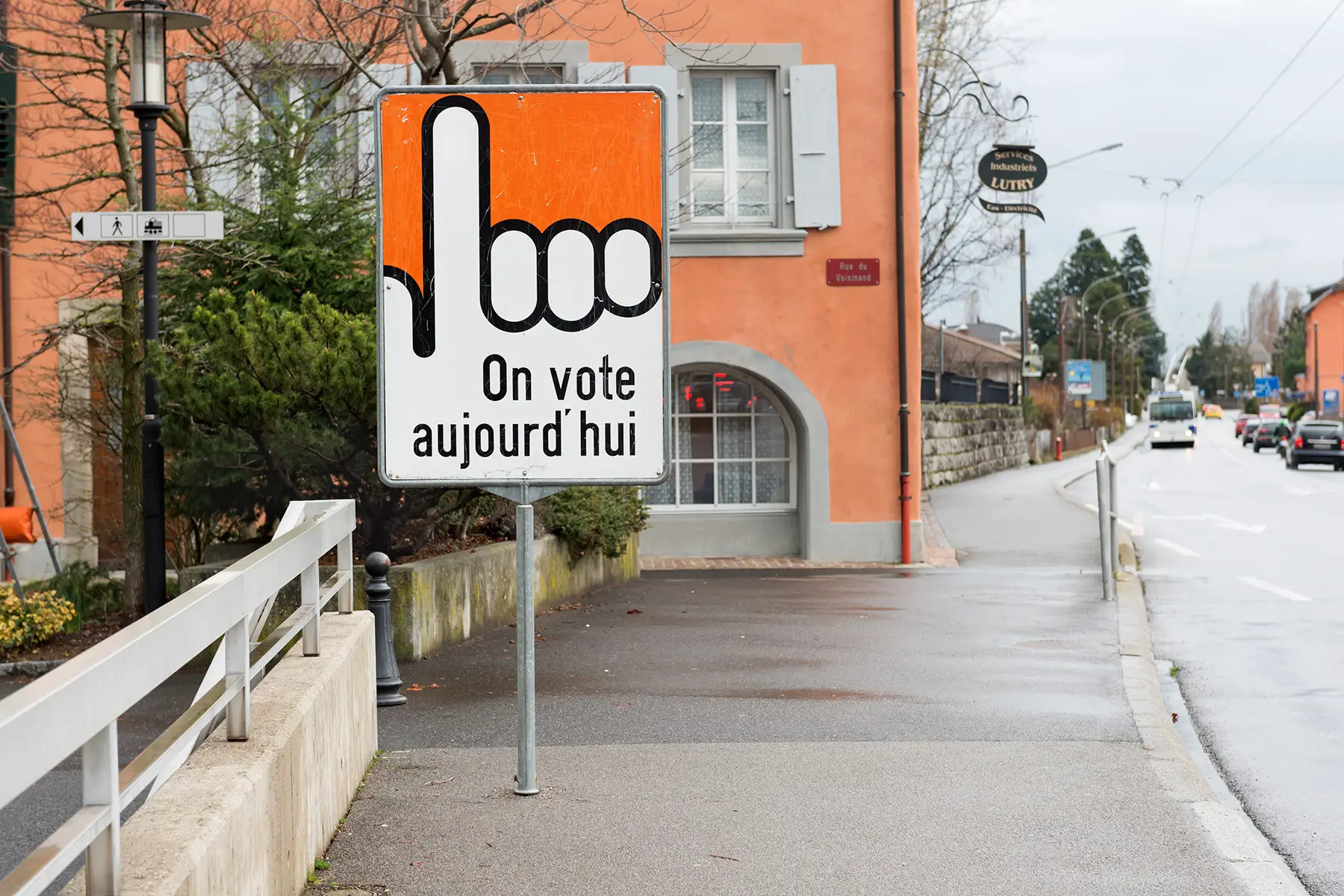
Other voting results include:
| National Council | Council of States | ||
| Party | 2024 results number of seat(s)* | Party | 2024 results number of seat(s)* |
| Social Democratic Party | 41 (+2) | The Center | 15 (+2) |
| FDP.The Liberals | 28 (-1) | FDP.The Liberals | 11 (-1) |
| The Center | 29 (+1) | Social Democratic Party | 9 (0) |
| Green Party | 23 (-5) | Swiss People’s Party | 6 (0) |
| Green Liberal Party | 10 (-6) | Green Party | 3 (-2) |
| Evangelical People’s Party | 2 (-1) | Geneva Citizens’ Movement | 1 (+1) |
| Federal Democratic Union | 2 (+1) | Green Liberal Party | 1 (+1) |
| Geneva Citizens’ Movement | 2 (+2) | ||
| Ticino League | 1 (o) |
Neither the left nor the right won a clear majority (which requires 101 seats on the National Council and 24 seats on the Council of States). So, parties will need to compromise if they want to govern efficiently.
According to the Democracy Monitor 2023, 46% of the Swiss population is rather or very dissatisfied with their government.
The electoral system in Switzerland
Swiss citizens can vote in three types of elections:
- Federal – every four years
- Cantonal – every four years
- Referendums – whenever
Switzerland’s federal elections use proportional representation (PR) to select the members of government. In other words, voters can pick their preferred candidate from the party list, and the party with the most votes wins.

Each region can select the democratic voting method for their cantonal elections. Most cantons use a ‘first-past-the-post system’ to elect their representatives. That means candidates are chosen by popular vote during one or two rounds. If the candidates fail to get the majority during the first round, there will be a second round to select the winner(s).
The last type of election, referendums, allows citizens to vote directly on a policy issue. These happen roughly four to five times a year. Switzerland has three kinds of referendums:
- Mandatory – any constitutional amendments that parliament approves must undergo a national vote in order to pass
- Optional – all Swiss citizens challenge a government approved bill to a nationwide vote. To do so, they must gather 50,000 valid signatures within 100 days of the publication of the new legislation.
- Popular initiative – all citizens can propose an amendment or addition to the Constitution. To do so, they must gather 100,000 voter signatures within 18 months.
Who can vote in Switzerland?
All Swiss citizens over the age of 18 have the right to vote in federal, cantonal, and policy elections in Switzerland (with the notable exception of “persons lacking legal capacity”).
Swiss expats living abroad may only vote in selected government elections if they have registered with the relevant representation abroad and are listed on the Register of the Swiss Abroad.
Cantons are free to set their own (additional) voting requirements. For example, Glarus allows 16- and 17-year-olds to vote at cantonal and communal levels. Neuchâtel, on the other hand, grants additional voting rights to foreign residents who’ve lived in the canton for at least five years.
You can check your area’s voting requirements on the Canton’s website.
How to vote in Switzerland
Voter registration is automatic in Switzerland. However, Swiss citizens living abroad must submit an application to exercise political rights before they can participate in an election.

Federal elections take place on Sundays. Roughly a month before the election date, you will receive a set of pre-printed lists and a blank list in the mail. This number of ballots varies from canton to canton.
You can send in your vote by post using the blank envelope that comes with the lists. Alternatively, you can drop the ballot into the ballot box at a polling station (German: Wahllokal, French: bureau de vote, Italian: seggio elettorale, Romansh: staziun da votaziun) in your area.

Writer and editor
Laura van der Most
Insider tip
Make sure to use the right postage when sending in your vote by post. Only Geneva and Fribourg offer free postage; elsewhere, you need to add a post stamp or your vote will be invalid.
The same procedure applies to cantonal elections. However, in addition, some cantons are currently testing online or electronic voting. You can check your area’s voting procedures on the Canton’s website.
Political representation in Switzerland
Anyone eligible to vote can stand for public office in Switzerland. This means that most Swiss citizens can run for the federal government, while foreign residents can participate in selected local politics.
The country does not have gender quotas for female political representation. Currently, women make up 38.5% of the National Council and 34.8% of the Council of States. Still, this is below the regional average of 31.7% and 31.3% respectively.
Interestingly, women’s representation differs per language region. According to Swissinfo.ch, “42% of female-elected parliamentarians are from German-speaking cantons, compared to 35% from French-speaking Switzerland and 13% from the Italian-speaking region.”

People with migrant backgrounds remain noticeably underrepresented in the Swiss government. While 40% of the population has a migration background, they are represented by a mere 5% of all parliamentarians.
What is the political landscape in Switzerland?
The history of Swiss politics
Switzerland has always been a union of different localities with different interests, languages, and dialects. The country developed from several alliances of towns and rural areas, the oldest version of the federation dating back to 1291.
The country as we know it today was established in 1848 with the adoption of a new constitution. While its history is similar to that of other nations, Switzerland has maintained its independence and thirst for neutrality. These unique characteristics are so important to Swiss politics and culture that the country even delayed joining the United Nations until 2002.
Women gained the right to vote in national elections after a referendum in as late as February 1971. The federal elections in October of that year were the first in which women could vote as citizens or stand as candidates.
These voting rights did not apply to cantonal elections, of course. As such, women only gained full suffrage after a 1990 decision by the Federal Supreme Court of Switzerland.
Discover more about gender equality and protection from discrimination in our article on women’s rights in Switzerland.
Switzerland and the European Union
Despite repeated invitations, Switzerland has always refused to join the European Union (EU). However, the country does have many agreements with the EU and is a member of the Schengen Area, which allows free movement for EU citizens and free trade with member states, among other things.

As is, Switzerland enjoys many of the benefits of being connected to the EU without taking on many of the responsibilities of being in the EU. Because this system has worked so well for the Swiss government for so long, there is little motivation to make a change.
Indeed, the majority of the Swiss population wants to remain independent from the EU. Reasons for this include:
- Not opening the Swiss job market and welfare system to low-income economies
- Maintaining direct democracy without any input from the EU
- Keeping their sense of independence, neutrality, and complete sovereignty
What is the state of the Swiss economy?
Switzerland is the seventh richest country in the world, ahead of San Marino, the United States, and Norway. As of 2023, its gross domestic product (GDP) is US$938.5 billion, or US$83,862.30 per capita. Understandably, then, that just under 15% of Swiss adults are millionaires (Global Wealth Report, 2024). This number is expected to increase to 19% by 2028.
Switzerland’s main industries are service and industry. Key components of the service sector include business, finance (i.e., banking and insurance), and tourism. The country’s industrial activities largely revolve around chemical and pharmaceutical production, mechanical/electrical engineering, and metals.
The International Monetary Fund (IMF) projects that Switzerland’s Real GDP will grow by 1.3% in 2024. This percentage is above the average growth rate for EU economies, which the European Commission forecasts to be 0.8%.
You can read more about inflation and average prices in our article on the cost of living in Switzerland.
Grassroots politics and political activism
Because direct democracy and referendums are at the center of Swiss politics, citizens can relatively easily challenge government legislation.
However, with such a slow-moving and consensus-based voting method, system changes can take a lot of work – especially if you can’t secure the required number of signatures or get the majority vote. This is perhaps why political activism has been on the rise in Switzerland.

One important focus of activism in Switzerland is climate change. The movement Climate Strike (German: klimastreik, French: grève du climat, Italian: sciopero per il clima, Romansh: greva dal clima) has routinely organized peaceful protests to demand an end to fossil fuel use and a boost of renewable infrastructure.
On the legal level, a group of Swiss women successfully sued the government in April 2024 for violating their human rights by failing to do enough to tackle greenhouse gas emissions. Despite the historic win, the Swiss upper house of parliament has already made moves to make the ruling inadmissible.
The wars in Ukraine and Gaza have also sparked protests. Since the beginning of the “armed conflict in Gaza”, several German-speaking cities in Switzerland have imposed temporary bans on demonstrations.
Useful resources
- Swiss government portal – official website of the Swiss government
- Ch.ch – official information portal from the Swiss government
- Swissinfo.ch – international news and information company with information on elections and voting in Switzerland


